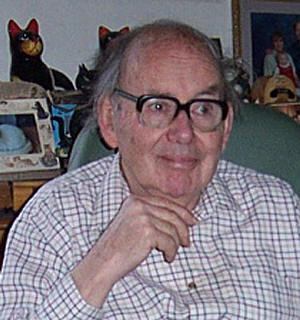Colin Seabright

Written by Ken Turner, with contributions from Ken Clayson
Colin Seabright sadly died after a short illness in February 2013. He is probably best remembered for his role as Manager of the Audio and Telecommunications Area (ATA) in Communications Department.
Colin joined the BBC in the mid 1950s directly after leaving University. He worked for a while in TV Section of Lines Department and then took up the post of GradeC Engineer as one of the team of four looking after the permanent audio circuits that terminated in the London Region. After a few years he gained promotion to a post in Telephones and Finance Section where he stayed for a few more years before being promoted to become Manager of the ATA.
Formed in 1967, the ATA was an amalgam of the SB Test Room (permanent audio circuits), the Telecommunications Test Room (telephone and teleprinter) plus some of the duties of the Sound OB Section. Colin’s first task was to combine these separate teams into a single unit located on the ground floor of BH Extension. He did this with great success and, leading by example, created an environment where work was a pleasure and where everyone felt part of the team.
Colin had a friendly personality and this was ideal for the close co-operation that was needed with British Telecom and BH Control Room to provide high quality programme circuits from a system that was designed for telephony in the pre-digital era. He also had the ability to keep a cool head in a crisis such as when the Camden Theatre lost all its circuits a few hours prior to a “Friday Night Is Music Night” broadcast and, on another occasion, when work for the new Victoria Line at Oxford Circus cut a major BT cable serving Broadcasting House. The six long-distance circuits from Bush House to Skelton were a constant problem which needed Colin’s expertise and good crisis management to restore service often with only a few minutes before transmission time.
At times Colin was described as being a Luddite but nothing could have been further from the truth. Fortunately Colin did not take offence but it seemed to amuse him. He had an “if it isn’t broke don’t fix it” attitude and made good use of available equipment and technology. However, if any new idea or equipment offered benefits he would adopt it with enthusiasm and inspire his team to do the same. Colin and his team were always looking for ways to meet new demands such as the ability to condition two vastly different circuits for stereo. One of their successes enabled stereo OB’s from far afield long before BT was able to offer this service.
Colin was well respected by his staff and by others who benefited from the work of the ATA. He willingly gave advice and tuition to anyone who needed it. This and his almost boyish enthusiasm is why so many (including myself) are grateful for the help he gave early in, and throughout, our BBC careers until he retired in 1993.
After retirement Colin and his wife continued to live at their home in Amersham, a town that he was very fond of. Colin was able to develop his interest in his local area by collecting old postcards and taking his own present day photographs of the same subjects. He also built up an impressive collection of old directories for his local area and these interests enabled him to publish several books that illustrate developments in his home town and its surroundings. Typically Colin never used a PC and his books were written using an old word-processor picked up at a car boot sale!